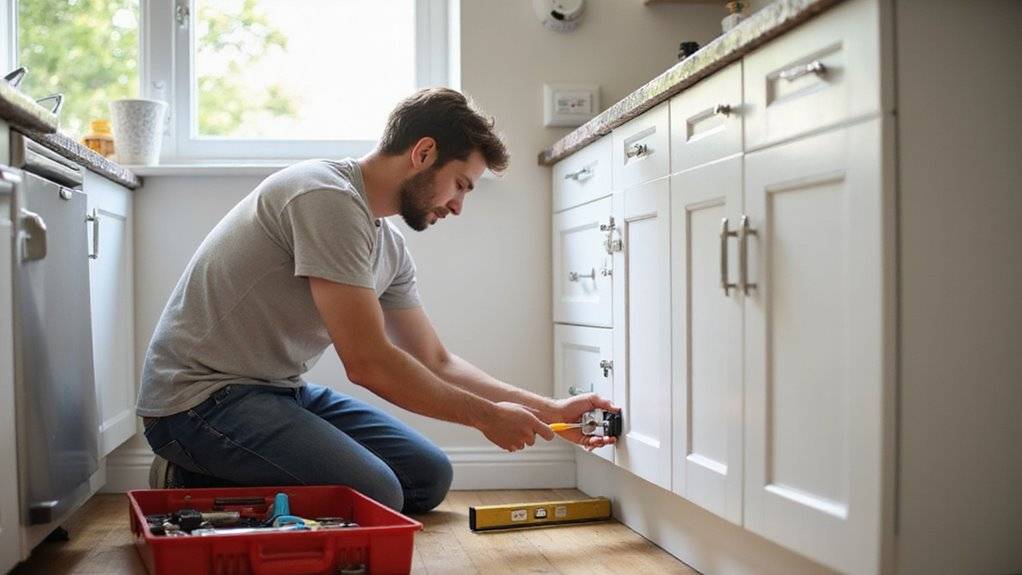Getting ready to sell your home can be stressful, especially when you discover code violations at the last minute. Many homeowners find hidden issues like old wiring or unapproved work just before listing. These problems can delay your sale or cost you money.
Buyers may walk away or demand big discounts if code violations are found during inspections. This can drag out the selling process and make it harder to get your asking price. Ignoring these problems may lead to fines or failed deals.
The best way to fix code violations before selling is to find and repair them early. Hire a professional to inspect your home and address any issues right away.
This simple step can help you sell faster and for more money. This blog will guide you through spotting and fixing code violations before you sell your house.
Key Takeaways
- Schedule a pre-sale inspection to identify all code violations and prioritize urgent repairs.
- Hire licensed professionals to fix electrical, plumbing, HVAC, and structural issues according to local codes.
- Obtain necessary permits for repairs and ensure all work is properly documented and inspected.
- Replace outdated smoke detectors, upgrade windows, and address safety features to meet current regulations.
- Organize receipts, permits, and before-and-after photos to prove code compliance to buyers and inspectors.
Understanding What Constitutes a Code Violation

A code violation happens when a property does not meet building codes or local safety rules. These codes cover things like electrical systems, plumbing, and fire safety. If inspectors find problems, the property is marked as non-compliant.
Owners should know that violations include things like unapproved room additions and missing smoke detectors. Outdated wiring or broken stairs also count as violations. If you plan to sell, you must fix these issues first. In St. Louis County, addressing code issues quickly can lead to a stress-free selling experience and prevent complications during the transaction.
A thorough property inspection can help find common safety problems. If you find and fix violations early, you can avoid fines or delays. Proper compliance keeps your property safe and legal. In some cases, sellers may choose to sell a house as-is, but they are still obligated to disclose all known violations to buyers.
Researching Local Building Codes and Regulations
To address code violations, first find accurate information on local building codes. City or county websites list current codes and zoning rules. These resources help you know exactly what applies to your property.
You must pay attention to property boundaries, setbacks, and easements. Local ordinances are different everywhere, so never rely on generic advice. If you have questions, contact the local building department for clear answers. In some cases, specific rules about transferring ownership or selling a property with existing issues may be outlined in local regulations.
Document the specific codes that relate to your situation. This helps you check the rules as you make repairs. If you do thorough research, you avoid wasting time or money on the wrong fixes.
Good preparation means you can solve violations and sell your property smoothly. If you’re dealing with code violations and want a stress-free selling experience, consider working with local experts who buy houses as-is and handle all paperwork.
Conducting a Pre-Sale Home Inspection

A pre-sale home inspection helps you find code violations before listing your home. If you find issues early, you can fix them before buyers notice. This makes selling your home easier and helps you avoid last-minute problems.
A licensed inspector will give you a list of repairs. You can then prioritize fixes that matter most for safety and market value. If you address these repairs, buyers are less likely to ask for discounts. In fact, working with cash home buyers in Florissant means you can sell your home as-is, even if there are repairs you choose not to make.
The inspection also helps you plan how to stage your home. You can fix visible issues that could hurt first impressions. If you improve curb appeal, more buyers may show interest.
Providing the inspection report to buyers can make negotiations smoother. Buyers may have more confidence if they see you fixed problems. This can help you close the sale faster.
If you want a quick and stress-free sale after fixing code violations, you might consider working with local investors who understand the West County real estate market, as they can make fair cash offers and handle all the closing details.
Reviewing Permits for Past Renovations
You should always check permits for past renovations, even if the work looks good. Permits show that changes followed local building rules. If work was done without permits, you may face problems when selling your home. It’s also helpful to review fair cash offers from local experts if you discover issues, since some buyers will purchase homes with code violations as-is.
Start by asking your local building office for the home’s permit records. Compare these records with renovation documents you have, like invoices or plans. If you find work without permits, collect all related paperwork.
Missing permits may cause delays or raise concerns for buyers. If you discover unpermitted work, talk to a contractor or inspector. Professionals can help you fix issues and make sure everything meets code.
When dealing with missing permits or other home concerns, working with trusted experts who buy houses as-is can help make the selling process much smoother and less stressful.
Addressing Electrical System Issues

Start by inspecting your electrical system for outdated wiring, such as knob-and-tube or aluminum, which can pose serious safety hazards. You’ll also need to check if your electrical panel and breakers meet current load requirements and safety codes.
Upgrading both wiring and panels ensures your system handles modern demands and passes inspection. Choosing a hassle-free process can also save you time and money typically spent on repairs before selling. Remember that foundation issues can also impact the overall safety and value of your home, so addressing all structural and electrical concerns before selling is crucial.
Outdated Wiring Replacement
Outdated wiring in your home can create safety risks and break local electrical codes. Old systems like knob-and-tube or aluminum wiring may cause fires. You must fix these problems before selling your property.
A licensed electrician should inspect your wiring if it is old. The electrician can find dangerous areas and code violations during the inspection. If they find hazards, full replacement is safer than repairs.
All new wiring should meet current safety codes. After the work, local inspectors must approve the job. Upgrading wiring can make your home safer and more valuable.
Panel and Breaker Upgrades
A panel or breaker upgrade makes your home safer and code compliant. Old panels may not handle today’s electricity needs and can be dangerous. Faulty breakers or panels can cause overloads, shocks, or even fires.
A licensed electrician should inspect your electrical panel and breakers. They can tell if you need a new panel or just breaker replacements. If your panel is small, rusty, or not UL-listed, you likely need an upgrade.
Breakers need replacing if they trip often, cannot reset, or look damaged. Upgrading panels and breakers fixes code issues and prevents hazards. This also gives peace of mind to you and future buyers.
Fixing Plumbing Violations
Start by pinpointing common plumbing issues like leaky pipes, improper venting, or faulty drains that often trigger code violations. Always hire a licensed plumber who understands the latest regulations and can correct problems safely. Make sure every repair meets your local plumbing codes to avoid future penalties and ensure long-term reliability.
If your property has had previous water leaks, thoroughly check for moisture and mold issues to prevent complications during the sale process. In some cases, correcting plumbing code violations can improve your financial statements and help facilitate a smoother transaction when selling your property.
Identifying Common Plumbing Issues
You can spot plumbing violations early by checking for warning signs in your home. Look for changes in water pressure, leaks, or slow drains. Early detection helps prevent expensive repairs.
If you notice water pressure changes, this could mean hidden plumbing problems. Visible leaks, corrosion, or loose pipe joints are also warning signs.
Slow drains often signal blockages or improper pipe installation. If you hear strange noises from faucets or toilets, there may be hidden issues.
Check if all fixtures have shut-off valves. Missing valves or poor pipe connections may indicate plumbing violations. If any of these issues appear, contact a professional plumber.
Hiring Licensed Plumbers
Licensed plumbers are needed to fix plumbing violations properly. They have the training and experience to handle complex issues. If you hire a licensed plumber, you reduce the risk of further problems.
Homeowners should not try to fix complicated plumbing themselves. Unprofessional work can cause more violations and expensive delays. Licensed plumbers know what is required to meet code standards.
Always check that your plumber gets the right plumbing permits before starting. These permits show that the work meets legal rules and will be inspected. Having permits protects your investment and helps the selling process go smoothly.
Meeting Local Plumbing Codes
Local plumbing codes set the rules for plumbing work in your area. You must follow these rules to avoid violations and fines. If you plan to sell your home, meeting these codes is required.
Start by getting a copy of your city’s plumbing code. Review the rules to see what applies to your property. If unsure, ask your local building department for help.
Inspect all plumbing systems and look for problems like leaky pipes or old fixtures. If you find issues, fix them right away to prevent further damage. Always check if plumbing work affects electrical systems nearby.
If you repair or upgrade plumbing, make sure it also meets electrical safety rules. Keep records of all repairs and changes you make. If needed, get permits and schedule inspections to confirm your home meets all codes.
Ensuring Safe and Up-to-Code HVAC Systems
Safe and code-compliant HVAC systems are essential for your home. Hidden code violations can affect both safety and efficiency. If you want to avoid issues, always check that your system meets local codes.
A licensed technician should inspect your system regularly. The technician will look for problems like bad wiring, old refrigerants, or poor ventilation. These are common code violations that can cause trouble later.
You may need to upgrade old equipment to meet current standards. Replacing old furnaces or air conditioners boosts energy efficiency and compliance. If you ignore upgrades, you risk costly repairs and failed inspections.
Ductwork is important for system safety and efficiency. Leaky or uninsulated ducts can waste energy and break code rules. If you fix them, you’ll lower your bills and avoid violations.
Keep records of all repairs and upgrades. Buyers and inspectors will ask for proof that your HVAC system is safe and up to code. Good documentation will help your home sale go smoothly.
If your HVAC system was installed before 1980, you should also consider checking for asbestos-based insulation as it may require professional inspection or removal to meet safety standards.
Correcting Structural Deficiencies

Correcting structural deficiencies is important to keep your home safe and up to code. Structural issues can affect the foundation, roof, or beams. If left untreated, these problems may cause further damage or safety risks.
A licensed structural engineer should assess any suspected issues. The engineer will check for foundation cracks, sagging roofs, or weak beams. If serious problems are found, repairs must begin quickly. Homeowners considering selling should be aware that proper documentation of repairs may be needed to support eligibility for capital gains tax exclusions.
Professional contractors should handle major repairs, not homeowners. They have the skills to fix beams, joists, or roof sections safely. All repairs must meet local building codes.
Homeowners need to get the right permits before starting work. If required, schedule inspections after repairs to confirm code compliance. Always save repair records and permits for future reference.
If you plan to sell your home, buyers may ask for proof of repairs. Inspectors also check that all repairs are up to code. Proper documentation will help avoid delays during a sale.
If you prefer to avoid making repairs yourself, consider fair cash offers from local buyers who purchase homes in any condition.
Updating Smoke and Carbon Monoxide Detectors
You should check the age and placement of your smoke and carbon monoxide detectors at least once a year. Detectors that are too old or in the wrong spot can be dangerous and may break safety rules. Regular checks help prevent problems and keep your home safe.
Local rules often require hardwired smoke detectors with battery backup. These should be placed in bedrooms, hallways, and on every floor. Carbon monoxide detectors are usually needed near bedrooms and any fuel-burning appliances.
If a detector is more than ten years old, it should be replaced. Always test each device to make sure it works. Detectors must be mounted on ceilings or high walls, away from vents and windows.
Proper updates help your home meet safety rules. If you follow these steps, buyers will feel more secure about the home. Keeping detectors current can prevent emergencies and save lives.
Resolving Window and Door Code Issues

Windows and doors must follow building codes for safety and energy savings. Homeowners should check these features before selling a property.
Meeting code helps avoid problems and increases home value. Check windows and doors for code compliance before selling to boost home value and prevent safety or legal issues.
Bedroom windows must allow safe escape in emergencies. All egress windows should be large enough for easy exit. If windows are too small, consider replacing them.
Energy-efficient windows help save on heating and cooling costs. Installing these windows can bring your home up to code. Old or damaged windows should be upgraded.
Solid-core doors are often safer than hollow-core doors. Replace hollow-core doors where safety rules require solid ones. Exterior doors need secure locks that meet local codes.
If you are unsure about any requirement, contact a licensed contractor. Professionals can find and fix code violations quickly. Fixing these issues early prevents delays during the sale process.
Repairing Decks, Patios, and Outdoor Structures
City inspectors pay close attention to decks, patios, and outdoor structures to ensure safety. They want to prevent injuries and protect property value. Unsafe structures can be a serious problem for homeowners.
You should check for loose railings, rotten wood, or shaky steps. If you find damage, replace boards and tighten fasteners. Proper repairs help avoid accidents.
Handrails and guardrails must meet local code for height and spacing. If they do not, you should make adjustments. Meeting code keeps your property in good standing.
Outdoor lighting is also important for safety and sometimes required by code. All exterior lights should work and be rated for outdoor use. Good lighting can prevent falls at night.
Trip hazards like uneven pavers or cracked concrete need fixing. If you see these issues, repair them to avoid accidents. Addressing problems shows buyers your property is safe and cared for.
Handling Unpermitted Additions or Conversions
Unpermitted additions or garage conversions cause problems for homeowners because they break building codes. These projects lower your home’s value and make selling harder. If your house has unapproved work, you must fix the issue before selling.
Homeowners should check city records and compare them to what is actually built. If you find differences, contact your local building department for help. The department can explain how to fix unpermitted areas.
You may need to hire a licensed contractor for an inspection. If required, submit plans and apply for retroactive permits. Contractors can help correct any issues to meet safety rules.
After making changes, schedule inspections to ensure everything meets code. Quick action can help you avoid delays or fines. These steps make selling your home much easier.
Documenting Repairs and Obtaining Final Inspections
To ensure compliance, keep detailed records of all repair work, including receipts, permits, and before-and-after photos. Organize this documentation so you can present it clearly during your final inspection. Once repairs are complete, contact your local building department to schedule a final inspection and confirm that all violations have been properly addressed.
Organizing Repair Documentation
Organizing repair documentation helps you manage the code violation correction process. Good records show you are following the rules. Clear documentation also makes inspections and home sales easier.
Homeowners should keep all relevant paperwork in one place if possible. You need to save receipts, invoices, and contracts from licensed workers. If you collect these, you can answer questions from inspectors or buyers.
Before-and-after photos help show what repairs you made. Permits and approval documents should be kept with your records. Recording repair dates and details adds another layer of proof.
If you organize your documents, you show that you are careful and responsible. Proper records can give buyers more confidence in your home. Well-managed paperwork can also prevent delays when selling your house.
Scheduling Final Inspections
You must schedule a final inspection with your local code office after finishing all repairs. This step confirms your property meets code requirements. It is necessary before selling your property.
Check your inspection checklist before the inspector arrives. Every repair should follow code standards. Make sure all required permits and documents are ready to show.
Inspectors may ask for receipts and before-and-after photos. Ensure repair areas are easy to access. Remove any items that could block the inspection.
Fix any small issues you notice before the inspection. Minor problems can delay approval if left unaddressed. If the inspector finds new issues, fix them quickly.
Request a re-inspection after making additional repairs if needed. A passing inspection report proves your property is compliant. This will help make the sale process faster and smoother.
Working With Qualified Contractors and Professionals
Working with qualified contractors and professionals is important for fixing certain code violations. Some repairs require licensed experts to meet building laws. If you use the right contractor, your repairs will pass inspection.
Always check a contractor’s license and insurance with your local office. Ask for references and look at past work before hiring. If you want to avoid problems, do not choose based only on the lowest price.
Ask for a written estimate and a clear timeline for the project. Good communication helps you understand the work and legal requirements. Qualified professionals protect your investment and make selling your home easier.
Conclusion
If you address code violations before selling, you can avoid costly delays and attract more potential buyers. Fixing these issues shows buyers that you care about the property’s condition. If you organize your paperwork, you make the selling process smoother and less stressful.
If you want to sell quickly, you have another option. We buy houses for cash, even if they need repairs or have code violations. If you choose this route, you can skip the hassle and sell on your timeline.
If you are ready to sell or have questions, reach out to us at Freedom Path Investors. We are here to help you every step of the way. Contact us today to get started.







